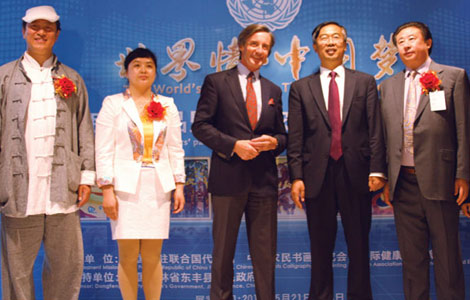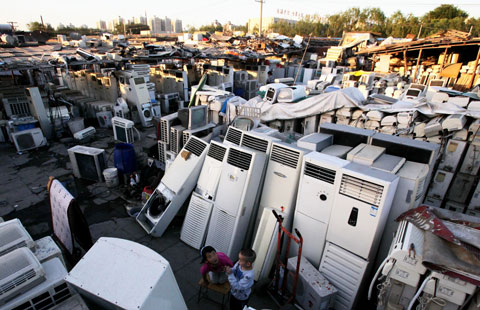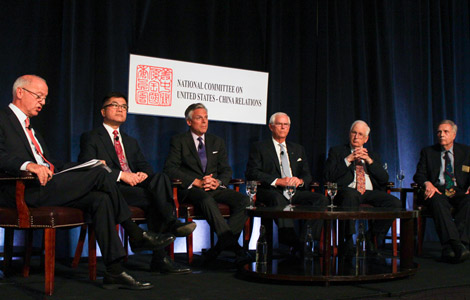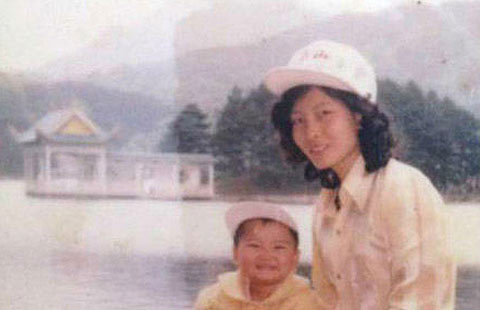A shot in the arm for vaccination plan
Updated: 2014-05-23 07:45
By Yang Wanli (China Daily)
|
||||||||
Polio is an enduring torment for Zhang Yiming, who lives in a village in Jiangsu province. His younger brother wasn't given a polio vaccine in infancy and contracted the disease in early life, leaving the 30-something unable to walk or even stand without assistance.
The cost of treating the disease quickly ruined the family. "Throughout my five years at primary school, I wore a pair of my father's shoes. They were far too big, but my parents couldn't afford another pair," Zhang said.
Unkind comments from local children added to the family's distress. "Some of the kids shouted at us, saying my brother was an idiot because he couldn't move without a wheelchair," Zhang said.
To give his youngest son an idea of life beyond the village boundary, Zhang's father bought a television set with money that had been earmarked for the elder boy's tuition fees.
"I ran to the TV shop, holding my dad's leg tightly and begging him to let me continue my studies," Zhang said. "It was one of the saddest moments in my life and I'll never forget it. I hated polio very much after that. Some people may not understand how important a small shot of vaccine can be, but my family does."
Immunization makes its mark
The Expanded Program on Immunization in China was initiated to support the government's efforts to control the spread of vaccine-preventable diseases through timely vaccination, effective surveillance, and by strengthening China's routine immunization program.
The EPI has three overarching goals: Maintaining poliomyelitis-free status until global eradication and subsequent certification are achieved; eradicating measles by 2015; and reducing chronic hepatitis B infection to less than 2 percent among children under 5 by 2012 (which has been achieved).
The EPI team works closely with the National Immunization Program to strengthen immunization systems, improve coverage and quality, support the implementation of targeted disease-prevention efforts (for illnesses such as measles, viral hepatitis and polio), and to examine the potential introduction of new vaccines.
Achievements:
In June 2012, China was officially certified as having reached the regional hepatitis B control goal, under which infection in young children was slated to fall from more than 7 percent to less than 2 percent. In fact, the goal was exceeded as the infection rate fell to less than 1 percent.
In November 2012, China was certified as having eradicated maternal and neonatal tetanus.
Between July and October 2011, the country experienced a polio outbreak caused by a nonnative polio strain, poliovirus type 1 (WPV1) from Pakistan. During the outbreak, 21 people were paralyzed by polio in four prefectures in the Xinjiang Uygur autonomous region. The local health department quickly moved to stop transmission of the virus. In November 2012, WHO officially recognized that the prompt and effective response to the outbreak confirmed China's status as a polio-free country.
Source: World Health Organization

 NYC comptroller honors Chinese businesswoman
NYC comptroller honors Chinese businesswoman
 JD records largest IPO of China firms in US
JD records largest IPO of China firms in US
 Chinese farmers' art paintings score at UN
Chinese farmers' art paintings score at UN
 Star fronts for ancient Chinese city
Star fronts for ancient Chinese city
 Former ambassadors ring the closing bell
Former ambassadors ring the closing bell
 Silk road shuffle
Silk road shuffle
 Largest Chinese group ever is visiting US
Largest Chinese group ever is visiting US
 US first lady promotes role of arts in education
US first lady promotes role of arts in education
Most Viewed
Editor's Picks

|

|

|

|

|

|
Today's Top News
US condemns market attack,experts call for stronger anti-terrorism campaign
Obama puts out 'Tourists Welcomed' sign
Lucy Li, at age 11, makes US golf history
China demands charges be dropped
US should rebalance its 'rebalance' policy
31 dead, 94 injured in Urumqi explosions
China upgrades cyber-security
US must 'get used to China's rise'
US Weekly

|

|







